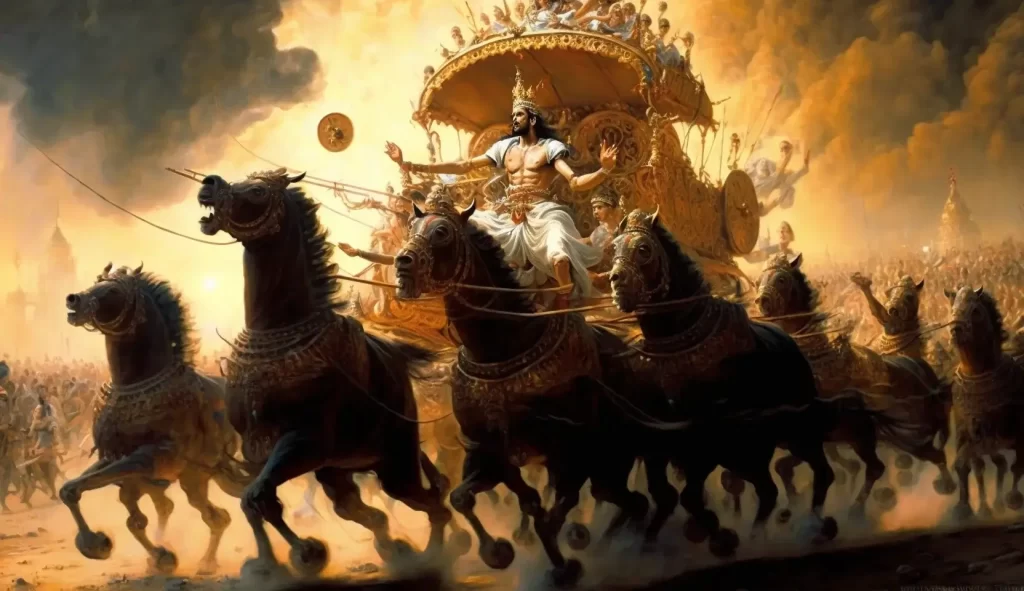Mahabharata Insider today brings some very deep lessons that can help you transform into a better being, with a better life.
By: Dr. Palash Thhakur (Celebrity Astro-Numerologist) | Connect on Instagram | Connect on Twitter
Mahabharata Insider – An Overview
Rishi Ved Vyasa wrote the Mahabharata in Sanskrit. He was also the grandfather of the Pandavas and Kauravas. The Mahabharata is the longest literature (100,000+ verses) that has ever been written. It and contains a vast treasure of wisdom and lessons for life.
The Mahabharata is undoubtedly one of the greatest works of the world, unique in many ways. Unique for the deepest philosophic truths, for the wide range of human life covered by the ethics and for the high spiritual stimulus provided in this epic.
The Mahabharata primarily revolves around the conflict between two branches of the Kuru dynasty, the Pandavas, and the Kauravas, for control of the throne of Hastinapura.
The story begins with the birth of the Kuru princes, who are the sons of King Pandu. The eldest Pandava, Yudhishthira, was known for his wisdom and virtue. However, his cousins, the Kauravas, particularly Duryodhana, harbored jealousy and rivalry.
One of the early incidents in the epic is the infamous dice game, in which the Kauravas manipulate Yudhishthira into gambling away his kingdom and even his brothers and himself. Draupadi, the wife of the Pandavas, is publicly humiliated by Duryodhana in the court, leading to a deep enmity between the two factions.
Following their loss, the Pandavas are exiled for thirteen years, with the last year to be spent incognito. They face numerous challenges and adventures during this time, including a year in the court of King Virata, where they assume disguises. Arjuna also receives divine teachings from Lord Krishna, who serves as his charioteer.
The epic culminates in the great Kurukshetra War, a colossal battle involving countless warriors and divine beings. The Bhagavad Gita, a sacred scripture within the Mahabharata, is a conversation between Arjuna and Krishna on the battlefield, addressing profound philosophical and ethical dilemmas.
The war results in the victory of the Pandavas but at a tremendous cost. Many noble warriors, including Karna and Bhishma, meet their end. The Kauravas are defeated, and Yudhishthira is crowned king.
Throughout the Mahabharata, the theme of dharma (righteousness) is central. Characters grapple with moral dilemmas and the consequences of their actions. The epic explores complex questions about ethics, duty, and the pursuit of justice. Lord Krishna plays a pivotal role, guiding the Pandavas and providing spiritual wisdom.
- It emphasizes the importance of upholding dharma, even in the face of adversity.
- It explores the consequences of pride, jealousy, and greed.
- It highlights the significance of family, friendship, and loyalty.
- It delves into the complexities of human nature, showcasing both nobility and flaws.
- It underscores the transient nature of life and the pursuit of spiritual realization.
Mahabharata Insider – Key Life Lessons
Dharma (Righteousness): Dharma is a central theme in the Mahabharata. It emphasizes the importance of living a life in alignment with moral and ethical values. The epic explores various interpretations of dharma and the dilemmas individuals face when making moral choices.
Karma (Actions and Consequences): The Mahabharata underscores the concept of karma, where actions have consequences. It teaches that one’s deeds, good or bad, will ultimately shape their destiny. This serves as a reminder to act with mindfulness and responsibility.
Conflict and War: The epic narrates the great Kurukshetra War, symbolizing the inner and outer conflicts faced by individuals and societies. It highlights the devastating consequences of unchecked ambition, ego, and the pursuit of power.
Family and Relationships: The Mahabharata delves into complex family dynamics, including sibling rivalries, parental responsibilities, and the consequences of favoritism. It teaches the importance of familial bonds, love, and duty.
Friendship and Loyalty: The friendship between Lord Krishna and Arjuna is celebrated, illustrating the importance of unwavering loyalty and support in times of adversity. It showcases the strength of true friendship.
Wisdom and Guidance: The Bhagavad Gita, a significant part of the Mahabharata, contains the teachings of Lord Krishna to Arjuna. It imparts wisdom on life, duty, spirituality, and the pursuit of self-realization.
Women’s Role: The epic portrays strong female characters like Draupadi and Gandhari, who display resilience and strength in the face of adversity. It raises questions about gender roles and the treatment of women in society.
Truth and Integrity: The story of Yudhishthira’s unwavering commitment to truth, even when it costs him dearly, exemplifies the importance of honesty and integrity in one’s character.
The Cycle of Life: The Mahabharata reflects on the transient nature of life and the inevitability of death. It encourages individuals to focus on the spiritual journey and the pursuit of liberation from the cycle of birth and death (moksha).
Unity and Brotherhood: While the epic depicts conflict and rivalry, it also emphasizes the importance of unity among brothers, cousins, and the broader society. It underscores the need for cooperation and collaboration for the greater good.
Forgiveness and Redemption: The Mahabharata demonstrates the power of forgiveness and redemption. Characters like Karna and Duryodhana, despite their flaws, find moments of redemption and humanity.
Leadership and Governance: The epic discusses the qualities of an ideal leader and ruler. It emphasizes the importance of just governance and the welfare of the people.
Spirituality and Devotion: The Mahabharata includes episodes of devotion and spiritual practices, highlighting the diverse paths to attaining spirituality and connecting with the divine.
The Role of Fate: The Mahabharata explores the tension between free will and fate. While individuals have choices, their lives are also influenced by destiny.
Learning from Mistakes: Characters in the epic make mistakes and face the consequences. It teaches the value of learning from one’s errors and evolving as a person.
– x – Mahabharata Insider – x –

